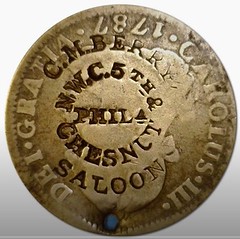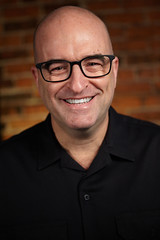
PREV ARTICLE
NEXT ARTICLE
FULL ISSUE
PREV FULL ISSUE
BILL GROOM INTERVIEW, PART TWOGreg Bennick's latest interview for the Newman Numismatic Portal is with counterstamp researcher Bill Groom. Here's the second of four parts, where Bill talks about how he got involved in numismatics, and how counterstamps are produced. -Editor Greg Bennick Well, how did you happen to start collecting coins and exonomia?
Greg Bennick And it's very cool. It's very cool. Now did your collecting interests evolve over the past 60 plus years? Where did you go after that time?
Bill Groom
Well, I went to college, spent five years in school, and I taught school after that - middle
school - and I got into civil service. I became a probation officer for 25 years in New York.
And then I retired in 2001. So about 20 years ago I retired. But after I graduated
college and finally got out where I was making a little money, I got back interested in the
coins and started going to the shows. And going to auctions and participating in auctions.
And so it just evolved from there. And I had gotten into collecting Lincoln cents quarters,
and Buffalo nickels. I had to put together a full horn set of Buffalo nickels, that was a fun
thing to do. So I got in matching condition coins and I created sets that had coins with the
same condition. And I got into type coin collecting, which I loved and had a beautiful
typeset, but the tokens always called out to me. And then I got a counter stamp, my first
one with a counter stamp I bought for five bucks at a local show and it was an Erie store
card. At the time, I didn't realize it was cataloged as a civil war token and I didn't have the
big store card book I think came out in 75, but this was about 77. I didn't have the book at
that time and that was stamped with a merchant. It had his name, his address, selling dry
goods, and it was on an 1859 Indian cent. That was my first counterstamp. And I thought,
Greg Bennick Now, you mentioned an Erie store card. For those who know what that is, for those who don't, could you describe real quick what an Erie store card is? Bill Groom Well, the Erie store card - there are two types of civil war tokens, two major varieties, ones is patriotic ones that have don't have any merchant advertising on them. Store cards are tokens produced during the Civil War that have advertising, whether it's a goods or service on them. And there are 10,000 different varieties of civil war tokens and the Erie store card was issued. It's the only one from Erie, Pennsylvania, and that's not far from where I lived, about 50 miles from where I lived at the time. So I was able to do some research on it. And I think I recall writing an article for the Civil War Token Society called The Erie Store Card and so on. If someone looks in your early journals they will find that article. Greg Bennick What sort of coin and exonumia articles have you written? You mentioned your research. Where have those articles been published? Bill Groom For about the past six years I've been writing a series of articles. I call it Punch Lines. For counter stamps, strictly about counter stamps. And they've been published in the journal of the National Token Collectors Association, and the journal is called Talkin' Tokens. I believe they're even offering a free subscription, temporary subscription. So you can go in and research the journals. And I think it's a very modest cost online. I think it's $18 a year. And I've also written with the Civil War Token Society a number of articles starting about 40 years ago now, I started writing articles for them on Civil War tokens and actually more recently on some counterstamps and a few of the counterstamps that I wrote about were actually produced during the Civil War period. Greg Bennick Counter stamps were produced punched letter by letter, meaning the name of a merchant. I just thought to ask this just now - or were they done with some sort of punch that that struck all of the merchants name at once? I mean, I've seen examples of both, but what was more common? Bill Groom Okay. That's an excellent distinction to make. With individual letter punches you have to really be careful about those because anyone with a set of punches can produce a counterstamp coin. This is one of the reasons pictures are so important of known counterstamps. There have been some fabrications of counterstamps and individual ones can easily be fabricated. There's one of the popular counterstamps which is called Vote the Land Free, and that's a prepared counterstamp. Now that counterstamp still exists in the Kansas State Historical Society. But there are some people who have created their own Vote the Land Free with individual letter punches. And they are not contemporary to the time, which was the 1840s. Now generally collectors should look for stamps that were created with one punch - it might have the whole name. All the letters are evenly aligned, they might be in a box or serrated box or a shape - some sort of almost like a little billboard to use Greg's term. Counterstamps that have initials, names, towns, occupations stamped not with individual misaligned letters but with a prepared punch. Because for someone nowadays to get a prepared punch done it could be costly and they are less likely to be fabricated.
To watch the complete video, see:
To read the complete transcript, see:
To read the earlier E-Sylum article, see:
THE BOOK BAZARREWayne Homren, Editor The Numismatic Bibliomania Society is a non-profit organization promoting numismatic literature. See our web site at coinbooks.org. To submit items for publication in The E-Sylum, write to the Editor at this address: whomren@gmail.com To subscribe go to: https://my.binhost.com/lists/listinfo/esylum All Rights Reserved. NBS Home Page Contact the NBS webmaster 
|

